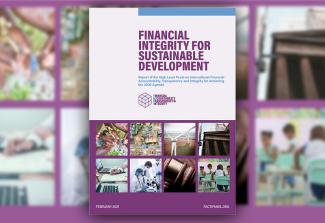Global governance
Global sustainability depends on financial integrity

Governments should do more to base the global financial system on accountability, legitimacy, transparency and fairness. These are the core components of financial integrity, according to FACTI, the High-Level Panel on International Financial Accountability, Transparency and Integrity. It was established in 2020 in support of the 2030 Agenda of the Sustainable Development Goals (SDGs).
Financial integrity, FACTI states, is indispensable. The panelists call for greater transparency in regard to:
- company ownership,
- public spending,
- prosecution of bribery,
- taxing the digital giants that dominate the internet,
- fighting money laundering and
- stemming tax evasion and abuse.
Too much money is currently syphoned off illicitly, FACTI states. According to its data, as much as 2.7 % of global GDP is money-laundered annually, while corporations’ use of tax havens cost governments up to $ 600 billion a year. Germany is said to lose the equivalent of $ 35 billion a year to tax avoidance. That money would suffice to install an additional 19 gigawatts of new onshore wind power per year. Recovering the annual loss to tax avoidance and evasion in Bangladesh would allow the country to expand pensions to 9 million additional elderly people. In the case of Chad, 38,000 classrooms could be built. The report also points out that Transparency International, the international non-governmental organisation, has documented cases of corruption and malfeasance in 17 countries, affecting public funds amounting to $ 1.1 billion.
In 2015, the global summit on financing for development in Addis Ababa discussed issues of this kind. It adopted the Addis Ababa Action Agenda. Participants committed to redouble efforts to substantially reduce illicit financial flows by 2030. To this end, countries agreed to combat tax evasion and corruption, both through strengthened national regulation and increased international cooperation. These measures were considered essential for achieving the SDGs, which were adopted by the UN General Assembly in the same year.
Pandemic impacts
The FACTI report sees the existing international and national frameworks as insufficient to tackle illicit financial flows. Even before the ravages of Covid-19 eviscerated public finances and confidence, there were fragilities in the international and national systems, it points out. The pandemic has made inequality worse moreover. FACTI reckons that 176 million people were plunged into extreme poverty, with extreme poverty increasing by seven percent in the months April to July 2020. On the other hand, billionaires’ wealth is said to have grown by 27.5 %.
FACTI is co-chaired by Ibrahim Assane Mayaki, former prime minister of Niger, and Dalia Grybauskaite, former president of Lithuania. It builds on work by UN agencies like UNODC, UNCTAD, UNDP and the UN regional commissions. While the panel members do not agree on every detail of the final report, they reached consensus on most recommendations. The most urgent steps, according to them, are:
- establishing a legitimate global ecosystem of laws, norms, standards and institutions that conforms to UN principles and standards,
- transforming the financial system in ways to address climate change and ensure sustainable investment.
- turning FACTI’s proposed values into guiding principles for national and international financial systems.
Report
FACTI Panel Report, 2021: Financial integrity for sustainable development.
https://uploads-ssl.webflow.com/5e0bd9edab846816e263d633/602e91032a209d0601ed4a2c_FACTI_Panel_Report.pdf









